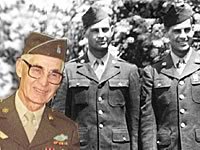 Willard
Diefenthaler served with the 106th Infantry
Division in Europe with his identical twin brother, Wilbur. Both
men were captured at the Battle of the Bulge and imprisoned in Stalag
9B, where Wilbur died. Willard was moved to Stalag 9A and was liberated
on Good Friday, 1945.
Willard
Diefenthaler served with the 106th Infantry
Division in Europe with his identical twin brother, Wilbur. Both
men were captured at the Battle of the Bulge and imprisoned in Stalag
9B, where Wilbur died. Willard was moved to Stalag 9A and was liberated
on Good Friday, 1945.
From the Willard Diefenthaler papers. Courtesy
of the Wisconsin Veterans Museum. Interviewed by Mark Van Ells.
Wisconsin Veterans Museum, December 1995. WWII photo: Willard (left) and
Wilbur Diefenthaler, May 30, 1943.
Willard and Wilbur
Diefenthaler trained at Camp Phillips, Kan., and both were assigned to
the 106th Infantry. Willard recalls how mistaken identity almost denied
him his first meal at the mess hall. He describes his chemical warfare
training and recalls witnessing British ingenuity in Oxford, England.
Willard Diefenthaler chronicles the early hours of the Battle
of the Bulge. Surviving those first hours was the first of many "lucky"
moments.
Diefenthaler describes his capture during the Battle of the
Bulge. Prisoners marched and dragged each other through the rain and
sleet to a railhead, where they were packed into boxcars for prison
camps. While waiting outside Lindberg Prison Camp, Diefenthaler narrowly
escaped strafing from an Allied plane. He recalls a moment of kindness
from a German civilian and describes the grim living conditions at
Stalag 9B in Bad Orb, Germany.
The Germans moved
Diefenthaler to Stalag 9A on Jan. 25, 1945. He describes his last
memories of his brother, Wilbur, who was too ill to move. Decades later,
Diefenthaler received his brother's final letter and met the American
medic who took care of Wilbur during his final days.
The Allies liberated Stalag 9A on Good Friday, 1945.
Diefenthaler describes how several prisoners exacted revenge against
"The Man of Confidence," the sergeant formerly in charge of the camp.
The next staging ground was Camp Lucky Strike in LaHavre, France, where
some former POWs died from overeating.
Diefenthaler
reflects on the importance of attending veterans' reunions. He notes
that POWs suffered during and after the war, and he commends
supportive POW wives.
http://www.wartimememories.co.uk/pow/stalag9b.html
 Willard
Diefenthaler served with the 106th Infantry
Division in Europe with his identical twin brother, Wilbur. Both
men were captured at the Battle of the Bulge and imprisoned in Stalag
9B, where Wilbur died. Willard was moved to Stalag 9A and was liberated
on Good Friday, 1945.
Willard
Diefenthaler served with the 106th Infantry
Division in Europe with his identical twin brother, Wilbur. Both
men were captured at the Battle of the Bulge and imprisoned in Stalag
9B, where Wilbur died. Willard was moved to Stalag 9A and was liberated
on Good Friday, 1945.